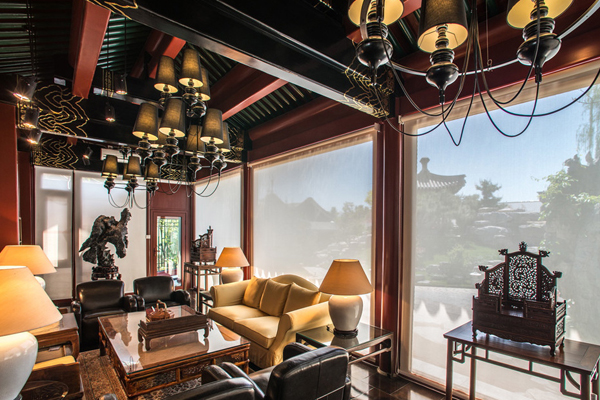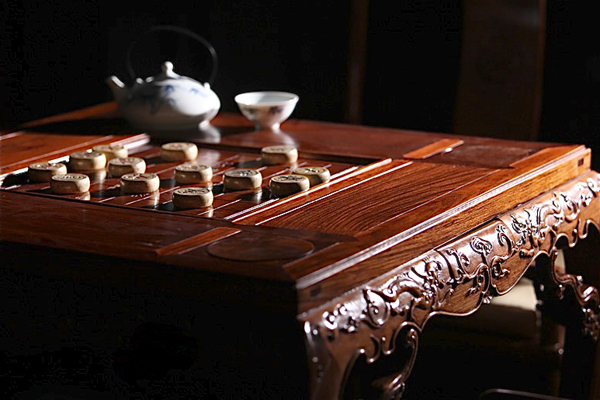
Deep in the Beijing suburb of Shunyi is a tiny boutique hotel with a pedigreed collection that many museums would kill for. Yet, it is an establishment that actually has an extremely select client list — those who really appreciate antiques.
Guests at Lv Garden dine on red sandalwood tables intricately inlaid with mother-of-pearl, or sleep in antique alcove beds framed by rosewood carvings. They may lounge on rare antique sets of ebony viceroy chairs, or relax on a single deer-horn chair, previously reserved only for the highest Manchu nobility.
 |
|
Lv Garden is more than a top-class retreat, where guests can literally travel back in time to an age of grace and beauty.Photos provided to China Daily |
The best way to appreciate antique furniture is tactile. You have to look at the lustrous patina that can only come with age, admire the grains of wood solidly fused, and appreciate the workmanship that craftsmen of the past invested into each and every piece.
Lv Garden is more than a top-class retreat for those who do not have to ask the price.
It is a place where guests can experience history and art from the past, from the glory days when a master carpenter thought nothing of spending years on crafting the perfect chair, table or cabinet.
The 38-room hotel is founded on the precious personal collection of a well-known Chinese author, playwright and screenwriter who is also an experienced hotelier. Lv Garden was actually his home before it was converted into this exclusive retreat that is defined as an "art gallery with rooms".
It is home to nearly 100 pieces of Qing Dynasty (1644-1911) zitan (red sandalwood) furniture and countless rare stones, calligraphy and paintings from the past 400 years. But the pride of place belongs to about 500 pieces of rare huanghuali (fragrant rosewood) furniture from the Ming Dynasty (1368-1644), displayed in the numerous rooms hidden in individual enclaves very much like the classic courtyards of the Forbidden City's old aristocracy.
They are scattered about the rooms, where guests can touch, sit and sleep on the antiques and get a rare insight into the relation between past and present.
 |
|
The hotel is home to nearly 100 pieces of Qing Dynasty (1644-1911) zitan (red sandalwood) furniture and countless rare stones, calligraphy and paintings from the past 400 years. |
The legendary huanghuali wood, gold outside and reddish-brown at its heart, has been treasured as far back as the Tang Dynasty (AD 618-907) and was mainly found in Hainan and Guangdong provinces and in areas neighboring today's Vietnam.
The trees grow so slowly that it usually takes hundreds of years for them to be usable as furniture and really large timber may be thousands of years old.
After the mid-Ming Dynasty, a thriving economy brought about a flurry of mansion building among the upper class, and the demand for fine furniture peaked. By the time of the late Qing Dynasty, fragrant rosewood in China was almost extinct.
Its rarity increased the value of this faintly scented wood, but it was also the impeccable craftsmanship of that era that made this style of furniture so valuable.
Wang Shixiang, a revered connoisseur of Chinese art, had always hoped to have a museum built in the architectural style of the Ming and Qing dynasties to display the furniture of that period. He wanted to create an experiential museum for visitors to observe traditional Chinese ethics and dignity.
Lv Garden aims to become just that, where guests can literally travel back in time to an ambiance of grace and beauty.
Its quadrangle courtyards are built in the northern and imperial styles, as opposed to the landscaped miniatures of the Suzhou gardens. Walls are painted in red, buildings observe a strict symmetry and beams and pillars are intricately carved and lacquered.
Quiet ponds are embellished with complex nine-turn bridges and gilt-topped pavilions. Every latticed window is a picture frame showing off a natural scene that ensures "a new view at each different step".
The ancient practice of separating living areas between the elderly and young in the family, superiors and juniors, has created a pleasing layout that preserves intimacy and privacy.
Each guest room enjoys a certain level of solitude with views blocked by rockery and screens of bamboo plants, or a subtle change of level up and down stairs.
Lounge areas, meeting and boardrooms are scattered but conveniently connected by winding corridors to the private rooms. Almost every public area has a large picture window to allow a full vista of the koi ponds and water features in the gardens.
Of course, Lv Garden also offers guests the complete hotel experience, with modern facilities such a gym full of high-tech equipment and conference and meeting facilities with all the full equipment.
In addition, guests can expect to be pampered by chefs who can whip up feasts that include Chinese, Japanese and Western cuisines, depending on preferences. One highlight is Yan Cuisine, named after the garden's owner and based on China's major cuisine styles. Vegetables and free-range eggs and poultry come from owner's own farm.
Lv Garden only has suites, and they do not come cheap, ranging from 4,000 yuan to 16,000 yuan ($654-2,614) a night. But, it will be a stay you will be talking about for a very long time.
The hotel is managed by the State-owned Hotel Kunlun, which is an associated company of the Shanghai-based Jinjiang International Hotels Group.
